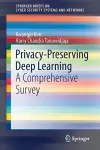
Privacy-Preserving Deep Learning
2 authors - Paperback
£53.99 was £59.99
Kwangjo Kim, received his B.Sc. and M.Sc. degrees in Electronic Engineering from Yonsei University, Seoul, Korea, in 1980 and 1983, respectively, and his Ph.D. degree from the Division of Electrical and Computer Engineering, Yokohama National University, Yokohama, Japan, in 1991. He was a Visiting Professor at the Massachusetts Institute of Technology, Cambridge, USA and the University of California at San Diego, La Jolla, USA, in 2005 and the Khalifa University of Science, Technology and Research, Abu Dhabi, UAE, in 2012. He was also an education specialist at the Bandung Institute of Technology, Indonesia, in 2013. He is currently a Professor at the Graduate School of Information Security, School of Computing, Korea Advanced Institute of Science and Technology (KAIST), and was the Korean representative to IFIP TC-11 and the honourable President of the Korea Institute of Information Security and Cryptology (KIISC). His current research interests include the theory of cryptology and information security and their applications. Prof. Kim served as a board member of the International Association for Cryptologic Research (IACR) from 2000 to 2004, the chairperson of the Asiacrypt Steering Committee from 2005 to 2008, and the president of KIISC in 2009. He is the first Korean Fellow of the IACR, a member of IEEEE, ACM and IEICE, and a member of the IACR Fellow Selection Committee. Moreover, he is the general chair of Asiacrypt2020 and PQCrypto2021 (including CHES2014). He serves as an editor-in-chief of the online journal Cryptography and an editor of the Journal of Mathematical Cryptology.
Harry Chandra Tanuwidjaja, received his B.S. and M.S. degrees in Electrical Engineering from the Bandung Institute of Technology (ITB), Indonesia in 2013 and 2015, respectively, and his Ph.D. degree from School of Computing, Korea Advanced Institute of Science and Technology (KAIST), South Korea. His research interests include malware detection, machine-learning, privacy-preserving, and intrusion-detection systems. Currently, he is working as a fixed term researcher for Cybersecurity Laboratory, National Institute of Information and Communications Technology (NICT), Tokyo, Japan (starting from July 2021).